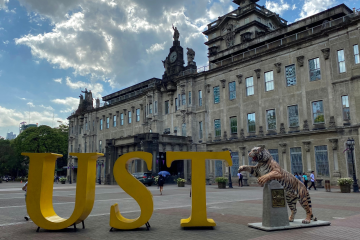
THE UNION representing UST Hospital employees has called for the revocation of the Manila ordinance requiring workers to secure a health permit or a professional tax receipt (PTR) and has urged University administrators not to bow to what it described as an “exploitative” policy.
In a statement posted on Facebook, Ugnayang Nagkakaisang Manggagawa – University Santo Tomas Hospital (UNM-USTH) urged the city government to “reassess” and “revoke” Ordinance 8793 or the Sanitation and Disinfection Code of the City of Manila issued in 2021, citing its “unnecessary” financial burden and Manila’s “questionable” facilities.
“The mandating of securing an annual health permit from the Manila Health Department from the employees and the health workers or the hospital is not only questionable but displays to be both redundant and ill-advised,” the statement, signed by UNM president Donell John Siazon and UNM board chairman Ronald Richie Ignacio, read.
Under the ordinance, all teaching and non-teaching employees must pay P625 to obtain a health permit, which must be renewed every year. Meanwhile, practicing professionals under government regulating bodies have the option to obtain a PTR instead.
To acquire a health certificate, employees must present a valid ID, stool and urine samples and a filled-out drug test form and biometrics to the Manila Health Department, which is headed by Lacuna’s husband Arnold “Poks” Pangan.
UST employees were given until July 31 to secure their health permit or pay for a PTR.
A document stamped by UST, the Manila Health Department and Lungsod ng Maynila, states that those who fail to follow the ordinance will be barred from accessing the University’s official online service portal MyUSTe, a sanction that was heavily criticized by Thomasian labor leaders. The possibility of non-compliant faculty members not getting teaching loads has also been raised.
UNM-USTH urged the University administration to side with its employees, saying it should not adhere to policies that supposedly do not conform to national laws.
“As for the UST administration, it’s high time to show leadership and solidarity to its workers. They must not kowtow to an ordinance that violates the rights of workers. National laws take precedence over ordinances,” the group said.
“If the city government holds true to their threats, well, they could, we want to see how the good mayor will go up against her own alma mater that had a profound impact [on] where she’s at now,” UNM-USTH added.
Manila Mayor Honey Lacuna is an alumna of UST, finishing her biology degree in the University in 1987.
The labor group also emphasized the financial and scheduling concerns surrounding the ordinance, noting that the University already provides a free annual health examination for its personnel.
“This questions the significance of the ordinance’s mandate, as not only is it unnecessary, but it also suggests being exploitative of workers who would need to pay for the annual health permit with their own money,” UNM-USTH said.
“Who will be compensating the employees of the hospital for their leave to secure a health permit already comprehensively performed inside the hospital, which possesses reputable facilities and testing.”
UNM-USTH likewise criticized the health and safety conditions of the facilities where the collection and testing of specimens would take place.
“The LGU [local government unit] of the City of Manila has yet to provide safe and sanitary spaces in health centers even without this mandate. If the LGU is truly enacting this ordinance with sincerity and genuine concern, workers would not be subjected to such conditions,” the employees’ union said.
“This includes the lack of gender-sensitive spaces, the lack of clean and hygienic facilities for specimen collection, and the questionable availability of facilities and equipment to be used to ensure the integrity of submitted specimen[s],” it added.
Ordinance 8793 states that “all laboratory examinations must be conducted by the PHL [Public Health Laboratory Division]…or other government-owned or private laboratory duly accredited by the DOH {Department of Health] and officially recognized by the Manila Health Department.”
The labor group questioned whether the health permit could accurately report a worker’s health status, citing the projected long queues and temperature of the health facilities, which it said could “jeopardize” the submitted samples.
“This implementation challenges the LGU of Manila on how truly prepared it is, both in facilities and in accommodating the projected volume of workers in the city while maintaining a standard reflective of the true health status of its workers,” it said.
UNM-USTH sought for an “immediate” reassessment of the Ordinance 8793’s provisions, deeming it “unfair” to workers in the capital City.
Late last month, the Organisasyon ng Nagkakaisang Empleyado-UST (ONE–UST), a coalition of the University’s employees’ unions, called for a review of the ordinance, saying it could disrupt the University’s operations.
As of July 29, more than half or 1,701 out of 3,261 UST employees have not secured a health permit , according to data obtained by The Flame. Of the figure, 1,409 are faculty members, 226 are non-academic personnel and 66 are administrative officials and staff.
The Council of Teachers and Staff of Colleges and Universities of the Philippines, a coalition of teaching unions from higher education institutions, has also joined calls to examine the policy, saying there are “discrepancies” in its implementation. F




[…] READ: Revoke ‘exploitative’ health permit ordinance, UST Hospital union urges Manila city govern… […]